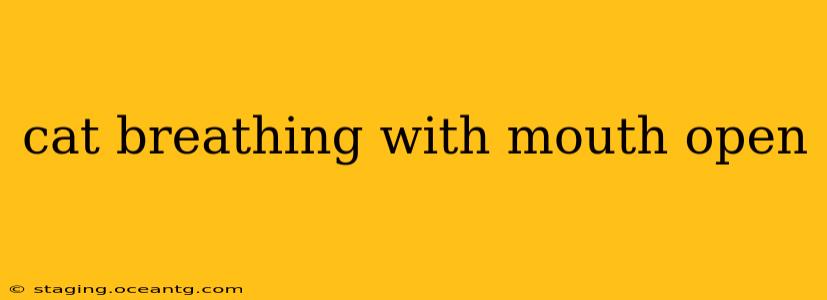Seeing your feline friend breathing with their mouth open can be alarming. While occasional open-mouth breathing is normal, especially after exertion, persistent or heavy panting can indicate an underlying health problem. Understanding the reasons behind this behavior is crucial for ensuring your cat's well-being. This comprehensive guide explores the causes of open-mouth breathing in cats, helping you determine when a veterinary visit is necessary.
Why is My Cat Breathing with Its Mouth Open?
Cats are obligate nasal breathers, meaning they're designed to breathe primarily through their noses. Open-mouth breathing is a sign that something is interfering with their normal respiratory function. Several factors can contribute to this:
-
Overheating: Just like humans, cats pant to dissipate heat. This is particularly common in hot weather or after strenuous activity. If your cat is panting lightly after playing, it's likely due to exertion and usually nothing to worry about.
-
Stress and Anxiety: Stressful situations can cause cats to pant. Changes in environment, veterinary visits, or even loud noises can trigger this response. Observe your cat's behavior; if it's exhibiting other signs of stress (hiding, avoiding eye contact, flattened ears), address the underlying cause.
-
Respiratory Infections: Upper respiratory infections (URIs), like feline herpesvirus or calicivirus, can inflame the nasal passages, making it difficult for your cat to breathe through their nose. Other respiratory illnesses, such as asthma or pneumonia, can also lead to open-mouth breathing. These infections often present with other symptoms like sneezing, coughing, nasal discharge, or lethargy.
Is My Cat's Panting Due to Pain or Illness?
Persistent or heavy panting accompanied by other symptoms should never be ignored. These symptoms could indicate more serious underlying health conditions.
-
Cardiovascular Issues: Heart disease can cause difficulty breathing, leading to open-mouth breathing, particularly during exertion. Other symptoms might include coughing, lethargy, weight loss, or a bluish tinge to the gums (cyanosis).
-
Heatstroke: This is a life-threatening condition where a cat's body temperature rises dangerously high. Symptoms include excessive panting, weakness, drooling, vomiting, and collapse. Immediate veterinary attention is crucial if you suspect heatstroke.
-
Asthma: Feline asthma is a chronic inflammatory disease affecting the airways. Cats with asthma may experience wheezing, coughing, and difficulty breathing, often resulting in open-mouth breathing, especially during attacks.
-
Pneumonia: This lung infection can cause severe respiratory distress, leading to labored breathing and open-mouth breathing. Other signs include fever, lethargy, and a persistent cough.
When Should I Take My Cat to the Vet?
It's vital to contact your veterinarian if your cat's open-mouth breathing is:
- Persistent: If the panting continues for an extended period or occurs frequently.
- Accompanied by other symptoms: Look out for coughing, sneezing, lethargy, vomiting, diarrhea, weight loss, or changes in appetite.
- Severe: If your cat is struggling to breathe or seems distressed.
- Sudden onset: A sudden change in breathing pattern requires immediate veterinary attention.
How Can I Help My Cat Breathe Easier?
While you shouldn't attempt to treat underlying medical conditions without veterinary guidance, you can provide comfort to your cat. Ensure your cat is in a cool, well-ventilated area, especially during hot weather. Reduce stress factors as much as possible. If your cat is struggling to breathe, gently support them and keep them calm until you can get them to a veterinarian.
What Causes a Cat to Breathe Rapidly with Their Mouth Open?
Rapid breathing (tachypnea) combined with open-mouth breathing is a serious sign that requires immediate veterinary attention. Possible causes include severe respiratory infections, heart failure, shock, or heatstroke. Don't delay seeking professional help if you observe this combination of symptoms.
My Cat is Breathing Heavily with Their Mouth Open After Surgery. Is This Normal?
Post-surgical panting is possible, especially after procedures involving the chest or abdomen. Your veterinarian will inform you about the expected recovery period and any potential complications. Contact them immediately if you have concerns about your cat's breathing after surgery.
Conclusion
Open-mouth breathing in cats warrants careful observation. While occasional panting is normal, persistent or labored breathing accompanied by other symptoms requires veterinary attention. Early diagnosis and treatment are crucial for preventing serious health complications. Always prioritize your cat's well-being by seeking professional veterinary care when necessary.
